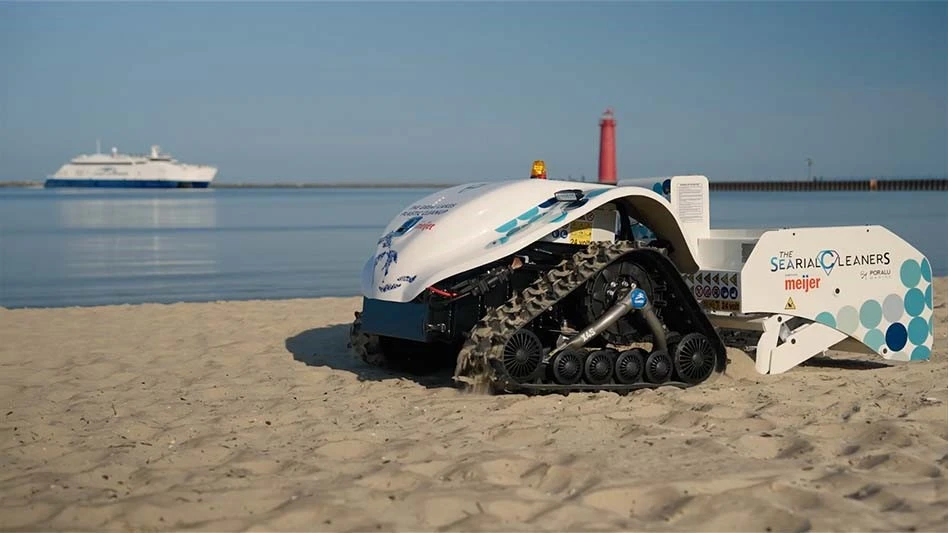
Photo courtesy Meijer
Midwest retailer Meijer is launching its participation in the Great Lakes Plastic Cleanup Program with the use of the BeBot and Pixie Drone. The goal is to clean up Midwestern beaches and waterways in partnership with the Council of the Great Lakes Region (CGLR).
According to a news release from Meijer, this initiative is supporting the single-largest deployment of these types of eco-friendly and remote-controlled devices across multiple states in the Great Lakes, which encompass the largest surface freshwater system in the world.
"It is a privilege to live near the Great Lakes, which inherently comes with the responsibility to protect them," says Meijer President and CEO Rick Keyes. "Contributing to the conservation of these invaluable waterways is important to the well-being of our ecosystems, economy and the communities we serve. Meijer has a strong history of environmental stewardship, and we're pleased to partner with the CGLR because the impact these initiatives will make will ultimately benefit generations to come."
Beginning this month, Meijer and the CGLR will lead cleanup projects at beaches, marinas and waterways in Michigan, Ohio and Wisconsin. It is in partnership with various community, state and environmental nongovernment organization partners.
Helping with the clean up are BeBot and Pixie Drone. BiBot is a remote-controlled electric beach cleaning robot that cleans 32,000 square feet per hour. It rakes through the sand without altering the beach environment and collects plastic litter and other waste, including cigarette butts, in a basket for disposal and recycling. Pixie Drone is a remote-controlled water drone that can collect up to 200 pounds of material per use. The drone will navigate through marinas and other waterways to collect plastic litter and other debris floating on the surface of the water. It also will collect other water data, such as temperature, pH, salinity, turbidity and dissolved oxygen.
Representatives from the Grand Valley State University Annis Water Resources Institute (GVSU-AWRI) will operate the equipment along the Muskegon lakeshore.
"Microplastics have become one of the most pressing issues facing our waterways, both in the Great Lakes and on a global scale," says Al Steinman, the Allen and Helen Hunting Research professor at GVSU-AWRI. "It is critical to resolving the microplastic dilemma, not only for the ecology of our local waters but also for the economy of our coastal communities, who visit and recreate on our beaches and lakes with the expectation they are clean and pollutant-free. The BeBot and Pixie Drone will help ensure those expectations are met."
The BeBot and Pixie Drone were funded by a $1 million donation Meijer made to the charitable arm of the CGLR, the CGLR Foundation, earlier this year. The deployment of these devices is part of the expansion of the Great Lakes Plastic Cleanup's plastic capture and recovery effort, an initiative that was started in 2020 by the CGLR and Pollution Probe.
"The Great Lakes, which are at the heart of the binational Great Lakes economic region, are a globally significant natural resource," says Mark Fisher, the president and CEO of CGLR. "By partnering with companies like Meijer, we are able to keep our beaches and waterways clean and free of plastic litter as we work to ensure the materials we use as consumers never become waste by adopting a circular economy mindset in the region."
Meijer is also working on various store-level projects that impact the Great Lakes. This includes one with the CGLR to install gutter bin stormwater filtration systems at select Meijer supercenters. The gutter bins will capture and prevent trash, debris, microplastics and other harmful stormwater pollutants from flowing into nearby waterways. Each bin captures hundreds of pounds of pollution per year.
The retailer is in the midst of two additional stormwater projects to retrofit the parking lots at its Traverse City and Benton Harbor supercenters with green infrastructure and is continuing its partnership with the Alliance for the Great Lakes on a handful of beach cleanup efforts.
"The Great Lakes are an area of immense value, and we are proud to be hands-on in the protection of these local waterways," says Erik Petrovskis, director of environmental compliance and sustainability at Meijer.
See them in action here.
Latest from Recycling Today
- BMW Group, Encory launch 'direct recycling’ of batteries
- Loom Carbon, RTI International partner to scale textile recycling technology
- Goodwill Industries of West Michigan, American Glass Mosaics partner to divert glass from landfill
- CARI forms federal advocacy partnership
- Monthly packaging papers shipments down in November
- STEEL Act aims to enhance trade enforcement to prevent dumping of steel in the US
- San Francisco schools introduce compostable lunch trays
- Aduro graduates from Shell GameChanger program





